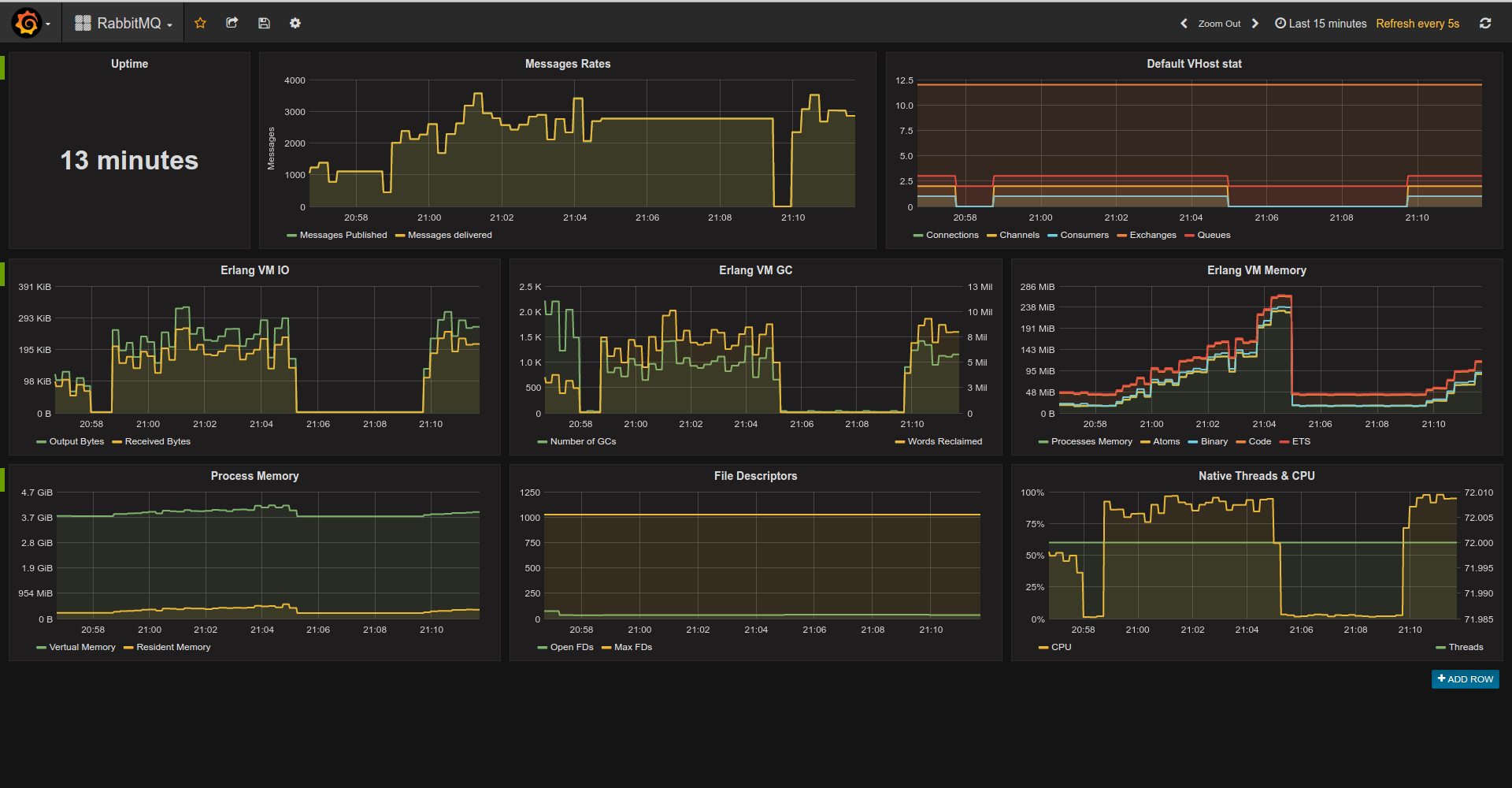Copyright (c) 2016,2017 Ilya Khaprov <[email protected]>.
Version: 4.11.0
Prometheus.io monitoring system and time series database client in Erlang.
- IRC: #erlang on Freenode;
- Slack: #prometheus channel - Browser or App(slack://elixir-lang.slack.com/messages/prometheus).
- Cowboy1/2 Exporters and Cowboy2 instrumenter
- Opencensus.io integration
- Ecto Instrumenter
- Elixir client
- Elixir plugs Instrumenters and Exporter
- Extatus - App to report metrics to Prometheus from Elixir GenServers
- Fuse plugin
- Inets HTTPD Exporter
- OS process info Collector (linux, freebsd, macos)
- Phoenix Instrumenter
- RabbitMQ Exporter.
- Install, Monitor Erlang Releases in Kubernetes with Helm + Prometheus
- Monitoring Elixir apps in 2016: Prometheus and Grafana
- A Simple Erlang Application, with Prometheus.
Version 3.x works on OTP18+. For older version (oldest tested is R16B03) please use 3.x-pre18 branch. 3.x-pre18 will work on all OTP releases starting from R16B03 and its beam will recompile itself to accommodate. For example, this branch is used by RabbitMQ Exporter 3.6.x that should be compatible with all versions starting from R16B03.
Rebar3 and rebar2 are supported.
Run shell with compiled and loaded app:
$ rebar3 shell
Start prometheus app:
prometheus:start().
Register metrics:
prometheus_gauge:new([{name, pool_size}, {help, "MongoDB Connections pool size"}]),
prometheus_counter:new([{name, http_requests_total}, {help, "Http request count"}]).
prometheus_summary:new([{name, orders}, {help, "Track orders count/total sum"}]).
prometheus_histogram:new([{name, http_request_duration_milliseconds},
{labels, [method]},
{buckets, [100, 300, 500, 750, 1000]},
{help, "Http Request execution time"}]).
Use metrics:
prometheus_gauge:set(pool_size, 365),
prometheus_counter:inc(http_requests_total).
prometheus_summary:observe(orders, 10).
prometheus_summary:observe(orders, 15).
prometheus_histogram:observe(http_request_duration_milliseconds, [get], 95).
prometheus_histogram:observe(http_request_duration_milliseconds, [get], 100).
prometheus_histogram:observe(http_request_duration_milliseconds, [get], 102).
prometheus_histogram:observe(http_request_duration_milliseconds, [get], 150).
prometheus_histogram:observe(http_request_duration_milliseconds, [get], 250).
prometheus_histogram:observe(http_request_duration_milliseconds, [get], 75).
prometheus_histogram:observe(http_request_duration_milliseconds, [get], 350).
prometheus_histogram:observe(http_request_duration_milliseconds, [get], 550).
prometheus_histogram:observe(http_request_duration_milliseconds, [get], 950).
prometheus_histogram:observe(http_request_duration_milliseconds, [post], 500),
prometheus_histogram:observe(http_request_duration_milliseconds, [post], 150).
prometheus_histogram:observe(http_request_duration_milliseconds, [post], 450).
prometheus_histogram:observe(http_request_duration_milliseconds, [post], 850).
prometheus_histogram:observe(http_request_duration_milliseconds, [post], 750).
prometheus_histogram:observe(http_request_duration_milliseconds, [post], 1650).
Export metrics as text:
io:format(prometheus_text_format:format()).
->
# TYPE http_requests_total counter
# HELP http_requests_total Http request count
http_requests_total 2
# TYPE pool_size gauge
# HELP pool_size MongoDB Connections pool size
pool_size 365
# TYPE orders summary
# HELP orders Track orders count/total sum
orders_count 4
orders_sum 50
# TYPE http_request_duration_milliseconds histogram
# HELP http_request_duration_milliseconds Http Request execution time
http_request_duration_milliseconds_bucket{method="post",le="100"} 0
http_request_duration_milliseconds_bucket{method="post",le="300"} 1
http_request_duration_milliseconds_bucket{method="post",le="500"} 3
http_request_duration_milliseconds_bucket{method="post",le="750"} 4
http_request_duration_milliseconds_bucket{method="post",le="1000"} 5
http_request_duration_milliseconds_bucket{method="post",le="+Inf"} 6
http_request_duration_milliseconds_count{method="post"} 6
http_request_duration_milliseconds_sum{method="post"} 4350
http_request_duration_milliseconds_bucket{method="get",le="100"} 3
http_request_duration_milliseconds_bucket{method="get",le="300"} 6
http_request_duration_milliseconds_bucket{method="get",le="500"} 7
http_request_duration_milliseconds_bucket{method="get",le="750"} 8
http_request_duration_milliseconds_bucket{method="get",le="1000"} 9
http_request_duration_milliseconds_bucket{method="get",le="+Inf"} 9
http_request_duration_milliseconds_count{method="get"} 9
http_request_duration_milliseconds_sum{method="get"} 2622
API can be grouped like this:
prometheus_counter- counter metric, to track counts of events or running totals;prometheus_gauge- gauge metric, to report instantaneous values;prometheus_histogram- histogram metric, to track distributions of events;prometheus_summary- summary metric, to track the size of events;prometheus_boolean- boolean metric, to track the state of something;prometheus_registry- working with Prometheus registries.
All metrics created via new/1 or declare/1. The difference is that new/1 actually wants metric to be
new and raises {mf_already_exists, {Registry, Name}, Message} error if it isn't.
Both new/1 and declare/1 accept options as proplist.
Common options are:
- name - metric name, can be an atom or a string (required);
- help - metric help, string (required);
- labels - metric labels, label can be an atom or a string (default is []);
- registry - Prometheus registry for the metric, can be any term. (default is default)
Histogram also accepts buckets option. Please refer to respective modules docs for the more information.
prometheus_text_format- renders metrics for a given registry (default isdefault) in text format;prometheus_protobuf_format- renders metrics for a given registry (default isdefault) in protobuf v2 format.
prometheus_buckets- linear or exponential bucket generators;prometheus_http- helpers for HTTP instrumenters;prometheus_mnesia- Mnesia instrumentation helpers.
You will need these modules only if you're writing custom collector for app/lib that can't be instrumented directly.
prometheus_collector- common interface for collectors;prometheus_format- common interface for exposition formats;prometheus_model_helpers- provides API for working with underlying Prometheus models. You'll use that if you want to create custom collector.
$ rebar3 compile
Prometheus.erl supports standard Erlang app configuration.
collectors- List of custom collectors modules to be registered automatically. If undefined list of all modules implementingprometheus_collectorbehaviour will be used.default_metrics- List of metrics to be registered during app startup. Metric format:{Type, Spec}whereTypeis a metric type (counter, gauge, etc),Specis a list to be passed toMetric:declare/1. Deprecated format{Registry, Metric, Spec}also supported.
Collectors config also supports "alias" option default. When used these collectors will be registered:
prometheus_boolean, prometheus_counter, prometheus_gauge, prometheus_histogram, prometheus_mnesia_collector, prometheus_summary, prometheus_vm_memory_collector, prometheus_vm_statistics_collector, prometheus_vm_system_info_collector
All 3d-party libraries should be configured via prometheus app env.
Exproters are responsible for maintianing scrape endpoint. Exporters usually tightly coupled with web server and are singletons. They should understand these keys:
path- url for scraping;format- scrape format as module name i.e.prometheus_text_formatorprometheus_protobuf_format. Exporter-specific options should be under<exporter_name>_exporterfor erlang or<Exporter_name>Exporterfor Elixir i.e.PlugsExporterorelli_exporter
Collectors collect integration specific metrics i.e. ecto timings, process informations and so on.
Their configuration should be under <collector_name>_collectorfor erlang or <Collector_name>Collector for Elixir i.e. process_collector, EctoCollector and so on.
For Erlang: prometheus_<name>_collector/prometheus_<name>_exporter.
For Elixir: Prometheus.<name>Collector/Prometheus.<name>Exporter.
Sections order:
Types -> Macros -> Callbacks -> Public API -> Deprecations -> Private Parts
install git precommit hook:
./bin/pre-commit.sh install
Pre-commit check can be skipped passing --no-verify option to git commit.
MIT




